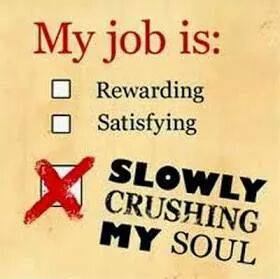In the April 4, 2017 Ask The Headhunter Newsletter, a reader doesn’t like what some consulting firms serve up. What happens when we stir the pot?
Question
My old consulting firm offered me the chance to interview for a full-time position in a smaller city over three hours away from where I am right now. My last contract ended a month ago, and just today I started a part-time job to slow the bleeding from my savings account.
The employer — the consulting firm’s client — refuses to do a phone screen, and insists that I drive over three hours, do a group interview, then drive home. Let’s see: mileage, wear and tear on my car, and losing an entire day where I have a lot of important things to do locally, all to interview for a job that (a) I don’t know if I would want, and (b) I don’t know if they would want me.
All that could be resolved (or at least mitigated to some degree) with a simple 30-minute phone conversation that they refuse to have. All right then, Company X, you decided for me — it’s not worth it! If you’re not going to respect this candidate, who not only has to spend an entire uncompensated day to interview, but also has to relocate if I did manage to get the position, then I’m walking away with my head held high. And no, even paying me mileage to get me to interview wouldn’t help. It’s more than the mileage. It’s the respect.
Am I being unreasonable?
Nick’s Reply
“Consulting” jobs seem to have changed the calculus of the job market — but not always for the better, and especially not when middlemen are involved. When you deal with an actual employer (your Company X) at arm’s length via a consulting or contracting firm, well, you call up the old saw about trying to wash your hands with rubber gloves on. You’re just not feeling it — and you’re at an enormous disadvantage.
The first question to ask is, who’s the jerk?
Is the consulting firm a jerk?
The “gig economy” recruiting practices of consulting firms create new problems — not just for workers like you, but for the employers that use them. Company X relinquishes its reputation to the intermediary consulting firm and its recruiters. Company X has no idea what that recruiter is saying to you or how it’s portraying Company X. This employer may be losing out on great candidates because the consulting firm is doing a lousy job of engaging with them.
Company X may be a great place to work, and it may treat people respectfully. It may have no idea what you’re being told.
A good headhunter or third-party recruiter manages the client company and helps it recruit and hire effectively. No recruiter worth his or her pay would use one-size-fits-all rules to recruit good workers. If the recruiter in this case can’t get the client to see the wisdom of a short phone call to establish mutual interest, then the recruiter and the consulting firm are jerks.
Is the employer a jerk?
The consulting firm and its recruiter, meanwhile, are so beholden to their clients that they’ll do anything clients want — like making ridiculous, counter-productive demands on candidates they’re recruiting.
Drive six hours round-trip without reasonable due diligence and without pay? (See Why employers should pay job applicants.) If that’s what this employer expects from the talent it’s trying to recruit, imagine what it expects from its employees. We already know what kinds of consulting firms it deploys. What kinds of people do you think it hires?
Should you just say no?
When an employer asks you to invest time to discuss a job, it’s got an obligation to invest in respecting your needs and requirements, too — or it’s not worth working for.
You just said no, and I can’t fault you for that. But you can also strike back — which I recommend you consider. Just because the contracting firm or the employer are behaving like jerks doesn’t mean you should let it slide. Raise your standards, and maybe you’ll raise, theirs, too. If you want to try this, strap on a rubber apron, because it can get a little messy.
Stir the pot
 Now that you’ve already said no, you can stir the pot. I love stirring pots. We never know what the result will be, nor does it really matter. What matters is stirring the pot, because that makes both the scum and the good stuff rise to the top so everyone can see what’s really in there. The fun starts if someone skims off the scum and it splatters. A mess like that usually triggers change. No mess, no change.
Now that you’ve already said no, you can stir the pot. I love stirring pots. We never know what the result will be, nor does it really matter. What matters is stirring the pot, because that makes both the scum and the good stuff rise to the top so everyone can see what’s really in there. The fun starts if someone skims off the scum and it splatters. A mess like that usually triggers change. No mess, no change.
I don’t know how much you want to stand on principle, but even if both the recruiter and the client (Company X) are acting like jerks, my guess is that Company X’s top management has no idea how you were treated. It’s reasonable to assume the company’s leadership wants to hire good people fast without alienating good candidates.
You can strike back at consulting firms that act like jerks by stirring the pot. If I were you, I’d place a call to Company X’s CEO. Help the CEO see what’s in that pot. Leave a brief message that inspires the CEO to call you back.
How to Say It
“I just had a troubling transaction with your company. If it were my company, I’d want to know about it. My number is… Feel free to call me if you like.”
Avoid leaving any more details, even with the CEO’s assistant, who is likely to channel you to HR if you say any more. Don’t even hint it had to do with a job. Politely insist that your message is for the CEO. If the CEO cares enough to call you back, you may be able to make a difference.
Show the CEO what you found
I’d calmly explain what happened without betraying any anger, frustration or rancor. Pretend the CEO is your best friend and you just want to be helpful. Don’t dwell on how you feel. Keep it factual. Keep it brief. Close by saying you’re sorry the HR department and the consulting firm’s recruiter weren’t willing to save you a six-hour drive by doing a phone call. Explain that you admire the company and would have seriously considered a job there.
Then end the call — don’t let the CEO end it. This puts you in the more powerful spot.
How to Say It
“I didn’t call you to resurrect a job opportunity or get a phone interview. I called you because if it were my company, I’d want to know someone who works for me is squandering good job candidates in the middle of a talent shortage. If this helps you in any way, I’ll be glad. I wish you and your company luck.”
It’s up to the CEO what to do next.
Strike back for higher standards
This kind of call accomplishes a few things.
- First, it demonstrates you’re a responsible business person and you care about your professional community — for the talent and for companies that need talent. This will come across to a good CEO if you keep the emotion out of your call.
- Second, it can help the CEO. A smart CEO will go clean up the company’s own HR practices or the contracting firm’s behavior. The CEO won’t let the company keep getting splattered. (See Why do recruiters suck so bad?)
- Third, you might just make an incredibly good contact that you’d otherwise never make. Handle this right, and you’ve got a new CEO friend.
Of course, you might wind up splattered, too — if the CEO doesn’t care about what you’ve revealed. Wipe yourself off and move on.
My compliments for keeping your standards high. Anybody who won’t take half an hour to talk with you to save you a six hour drive isn’t worth thinking about. If the CEO cares, you’ve just helped improve Company X.
Reconsider the consulting game
The other issue here is your “consulting firm.” I think I’d give them the heave-ho. While there are some good contracting firms out there that respect both their client companies and people they recruit, I think there are far more questionable practitioners of this corporate pimping game. (See Will a consulting firm pay me what I’m worth?)
Many people rely on contracting jobs and contracting firms to make a living, but I encourage you to re-think how you get your work. Find some good companies that will employ you directly. Take off the rubber gloves and make real contact. (See Pursue Companies, Not Jobs.)
The more I observe the mechanics of washing hands with rubber gloves on, the less I like it. Too many players in the consulting industry are acting too much like the second oldest profession in the world. Pimping workers and skimming cash out of the economy — while treating those workers disrespectfully and disdainfully — without adding any real value is a questionable business model at best. (See What the Federal Reserve doesn’t know about recruiters.) The talent starts to behave — and feel — an awful lot like the oldest profession in the world.
It’s not hard to recognize the good consulting firms. You know them from their reputations and from their behavior. But the talent seems to have become so accustomed to poor treatment that the bad players thrive. It’s up to you to know the difference.
Some will chide me for saying this, because the analogy might not seem fair. Maybe there’s something good in hiring a firm to hire your employees. But there seems to be an awful lot of scum floating in this pot. So pardon me if I stir harder — because I think we need to see what floats to the top.
Do you work for consulting firms? Do you prefer gig work, or do you take assignments because you feel you have no choice? What’s the good stuff about contracting? And what’s scummy about it? How do the recruiters treat you?
: :


 We all know age discrimination is not legal. I’m an analytical chemist with a graduate degree and 40 years experience in analytical chemistry. Although I would love to retire and enjoy my grandchildren, I still have the desire (and mental capacity) to work. My issue is simple. I can’t get past the front door. Employers just look at the experience in years and it becomes a matter of “Let’s interview him so we can check off the EEO box.”
We all know age discrimination is not legal. I’m an analytical chemist with a graduate degree and 40 years experience in analytical chemistry. Although I would love to retire and enjoy my grandchildren, I still have the desire (and mental capacity) to work. My issue is simple. I can’t get past the front door. Employers just look at the experience in years and it becomes a matter of “Let’s interview him so we can check off the EEO box.”
 Recent reports from the Federal Reserve suggest that switching jobs — and probably employers — is the best way to boost your salary and your career.
Recent reports from the Federal Reserve suggest that switching jobs — and probably employers — is the best way to boost your salary and your career. I have your book,
I have your book,  Here are my two rules about salary disclosure:
Here are my two rules about salary disclosure: He was hoping to get a 10% salary bump. After a lot of assessment including talking with his references and having him talk with an industry expert whose opinion I respected, I knew he’d be great for a very different kind of job with my client.
He was hoping to get a 10% salary bump. After a lot of assessment including talking with his references and having him talk with an industry expert whose opinion I respected, I knew he’d be great for a very different kind of job with my client. Would you ever advise quitting a job before having another one lined up? I have completely lost faith my employer and job and I fear getting fired or worsening what’s left of my relationships here. I’d like to quit now. Is that a bad idea? Thanks.
Would you ever advise quitting a job before having another one lined up? I have completely lost faith my employer and job and I fear getting fired or worsening what’s left of my relationships here. I’d like to quit now. Is that a bad idea? Thanks. Unemployment bias and misery
Unemployment bias and misery Question
Question “Hospitals, nursing homes, home care agencies and doctor’s offices, like a lot of employers across the country, have a specific resume in mind. Employers often want new hires to have experience in a specialty such as operating room nursing.”
“Hospitals, nursing homes, home care agencies and doctor’s offices, like a lot of employers across the country, have a specific resume in mind. Employers often want new hires to have experience in a specialty such as operating room nursing.” WANTED: Top Talent Cheap!
WANTED: Top Talent Cheap! I keep getting random e-mails from recruiters. I have finally hit the breaking point and now I have a new response: “Thank you for your interest. I am not searching at this time. In addition, I work only with hiring managers, never a recruiter.”
I keep getting random e-mails from recruiters. I have finally hit the breaking point and now I have a new response: “Thank you for your interest. I am not searching at this time. In addition, I work only with hiring managers, never a recruiter.” Nick’s Reply
Nick’s Reply I worked as an intern while in college, and after graduation they offered me a job. It was my first experience negotiating higher job offers. I discussed my proven performance and gave examples that demonstrated my value. The employer granted me the higher salary.
I worked as an intern while in college, and after graduation they offered me a job. It was my first experience negotiating higher job offers. I discussed my proven performance and gave examples that demonstrated my value. The employer granted me the higher salary.